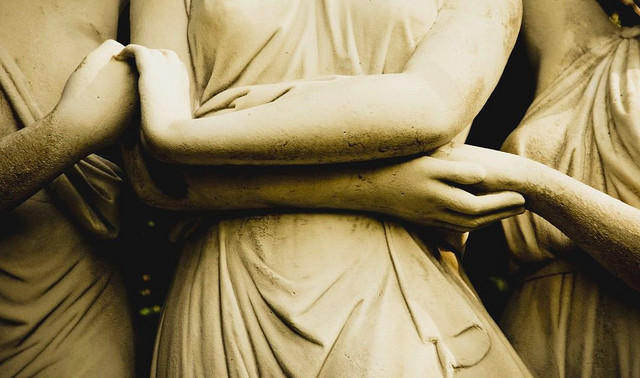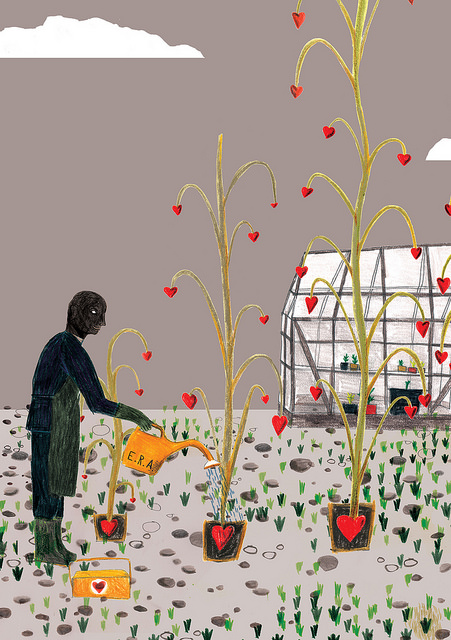Choose Love – Turning Anger into Connection
One night in the end of my term at AIESEC global team, I had this bizarre dream of being bossed around the office by one of my successors. He kept shouting, and forcing me to clean my desk, throwing my stuff in an old carton box, as if I was a shamefully fired employee, so his new team could move in. And then this peculiar thing happened: out of nowhere, two buttons popped up, like on a computer screen, and I could click on one to choose my response. “Cruelty” was written on one of the button, and “Empathy” on the other.
At first, I just found the dream ridiculous, but after a while I realized it carried meaning. Whether to act with empathy is the choice we need to make, many times, every single day. Isn’t it?
The other day, I gave a short consultation at the Young Leaders’ Conference in Hanoi. The topic was “People Connection” with a focus on handling conflict. I said to 40 presidents, vice presidents of young associations that I genuinely believed the most important catalyst for connection and for turning conflict to positive team dynamic was Empathy. (there, to demonstrate “putting yourself in others’ shoes”, I took off my high heels and tucked my feet into a pair flat shoes – well party because the damn heels were squeezing my feet like sushi chef squeezing hot tea towel.)
Let me tell you a small story of empathy. A couple of days ago, my mother was fetching me home on a motorbike. It was late in the evening; I was enjoying the night breeze and the silence. As my mother drove into the alley close to our house, we heard sudden loud honk right behind. In a flash, a girl in provocative red outfit drove her motorbike past us, turned her head backward howling in anger straight at both me and my mother a series of bad words.
I was startled. How could her? It was like being shat on the head by a pigeon flying across the street! When I realized what just happened, I got furious at this horrible, indignant female being. I wished a small bad thing would happen to her, like her red dress would catch fire, or tomorrow she would wake up losing all her teeth. Then I heard my mother sighing, without much surprise by the event: “That must be a prostitute.” she said.
It’s true. The short dress, the heavy make-up; the smell of cheap perfume, the tone in her voice. Two years away from home, I’d forgotten how notorious my area was as a place where prostitutes might hang out. First, a sense of disgust rose at the back of my throat. Then something else kicked in as I started to imagine the life of a prostitute. Night after night, having one’s body and dignity squandered by the lust of men. The darkness, the smell, the sweat, the tormenting hours. My anger gradually diminished and I even felt a sense of tenderness toward that woman, whose life had been so rough it turned her into something else. Maybe it was the only language she’d ever been taught. Maybe the impudence she’d shown to people was just the endless loathing she’d poured on herself behind closed door. Maybe the rage she expressed to the world was a false armor she wore to protect her fragility, in hopelessness.
Anne Lamott wrote a very witty and poignant passage about empathy in her book “Bird by Bird”:
“The conscious mind seems to block that feeling of oneness so we can function efficiently, maneuver in the world a little bit better, get our taxes done on time. But it’s even possible to have this feeling when you see – really see – a police officer, when you look at him and you see that he’s a living breathing person who like everyone else is suffering like a son of a bitch, and you don’t see him with transparency over him of all the images of violence and chaos and danger that cops represent. You accept him as an equal.”
 (Illustration: "We are all connected")
(Illustration: "We are all connected")
Lamott touched swiftly the philosophy of “Oneness” – or Wholeness - the assertion of modern spirituality, which I embraced and has become my personal conviction. So, what is it? I wrote about it at the end of another entry titled “Humming Bird”. It is a belief that beyond physical reality there is something greater that connects us all. That I honor the Whole in you and is also in me. That “there are no absolute boundaries between the body/ego and the totality of existence.”(Stan Grof)
I didn’t want to sound like Yoda here. I just haven’t figured out how to explain it in a more practical or pragmatic way. (At the same time, I’m not sure if all things could be or should be explained that way, and if it’s right for us to always demand practicality and pragmatism.)
I just know that this belief freed me from my old way of seeing the world, which was done through a selfish, arrogant, narcissistic binocular. If I am part of the Whole, and the Whole is in me, I am insignificant and magnificent at the same time. If you and I are One, we are equal, even when one of us might wear sloppier jacket.
Only when superiority vanishes and acceptance takes over, genuine love and empathy will emerge.
On a more practical angle, Gretchen Rubin in “The Happiness Project”, one of the most practical books on the subject of happiness wrote “Studies show that aggressively expressing anger doesn't relieve anger but amplifies it. On the other hand, not expressing anger often allows it to disappear without leaving ugly traces.” This suggests that acting with empathy, even when being treated with disrespect, does not mean that you are a doormat but that you are guarding our inner peace. And let’s not forget that we can disagree and empathize with a person at the same time, like how I felt for that resentful, unfortunate woman.
I think it’s odd that the person we find most difficult to show empathy the most are those closest to us. (If it’s just me, please tell me!) A mother and a daughter. A husband and a wife. Why? May be what always present is the hardest to notice, to treasure, to see them anew every morning.
My mother and I used to argue every time our conversation extended 10 minutes. She is a terrific woman in her work and her care of the family. She just has her own way of expressing it. And it hasn’t worked on me so well ever since teenage. I thought, and still think the world she’s tried to project is too fearsome, and the way she’s raised me up has been too controlling and protective.
Whenever I got grumpy, I tried to remind myself that the woman who gets paranoid when I come home after 10 PM or eat too many eggs, was also the woman who, one year ago, drove me to the airport, packed me a delicious sandwich, gave me some money, and sent me off for a year in Europe, because I’d insisted to do something she’d never been able to understand or forbid. She chose to support my crazy dream. Because in her heart, at that moment, love won over a mother’s fear that the world might break her child.
When I make an effort to see her, really see her, there is only love.
But of course I’m no Gandhi. My empathy goes hiding from time to time, especially when I have a migraine. There are days, when we talked for more than 10 minutes, and before I started barking, I took a deep breath, closed my eyes, put the souls of my hands together, and chanted “Patienceeeeeeeee… Nam mo a di da phat… Patienceeeeeeee…” At first, her face froze in disbelief. After a couple of times, whenever I did so, my mother seemed to understand that she might have gone too far, and decided to burst into laughter instead.

When was the last time you chose anger instead of empathy?
How thing could have been different if you'd chosen love?
- - -
Featured Photo Credit: @Doug88888



